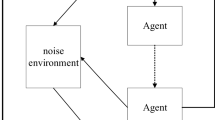Abstract
With the development of society, the importance of physical education for college students is becoming increasingly prominent. However, traditional methods for evaluating the quality of physical education teaching have subjectivity and shortcomings, and computer technology needs to be introduced to improve the objectivity and accuracy of the evaluation. This paper proposes a light image enhancement algorithm based on reinforcement learning to improve the quality evaluation of college students’ physical education. Reinforcement learning algorithm is used to learn the optimization strategy of optical image enhancement. Firstly, through the observation of a large number of image samples and the analysis of image features, an evaluation model based on optical characteristics is established. Then deep reinforcement learning method is used to learn the optimal light image enhancement strategy through interaction with the environment. Based on the evaluation model and analysis results, evaluate the quality of physical education teaching for college students. The method of association rules was used to associate the teacher’s information with the teaching process. By analyzing the connection between teachers’ personal information and the teaching process, the system can provide targeted feedback to help teachers better carry out teaching work.




Similar content being viewed by others
Data availability
The data will be available upon request.
References
Alwidian, J., Hammo, B.H., Obeid, N.: WCBA: weighted classification based on association rules algorithm for breast cancer disease. Appl. Soft Comput. 62, 536–549 (2018)
André, S., Maulana, R., Helms-Lorenz, M., et al.: Student perceptions in measuring teaching behavior across six countries: a multi-group confirmatory factor analysis approach to measurement invariance. Front. Psychol. 11, 273 35–47 (2020)
Baker, J.W., Lee, C.: An improved algorithm for selecting ground motions to match a conditional spectrum. J. Earthquake Eng. 22(4), 708–723 (2018)
Feinberg, B.A., Bharmal, M., Klink, A.J., Nabhan, C., Phatak, H.: Using response evaluation criteria in solid tumors in real-world evidence cancer research. Future Oncol. 14(27), 2841–2848 (2018)
Hichem, H., Rafik, M., E H D A O U I, Ouahiba, C.: New discrete crow search algorithm for class association rule mining. Int. J. Swarm Intell. Res. (IJSIR). 13(1), 1–21 (2022)
Higson, E., Handley, W., Hobson, M., Lasenby, A.: Dynamic nested sampling: an improved algorithm for parameter estimation and evidence calculation. Stat. Comput. 29, 891–913 (2019)
Kusumaningrum, D.E., Sumarsono, R.B., Gunawan, I.: Professional ethics and teacher teaching performance: measurement of teacher empowerment with a soft system methodology approach. Int. J. Innov. Creativity Change 5(4), 611–624 (2019)
Mailizar, M., Almanthari, A., Maulina, S.: Examining teachers’ behavioral intention to use E-learning in teaching of mathematics: an extended TAM model. Contemp. Educational Technol. 13(2), 458–466 ep298 (2021)
Noaman, A.Y., Ragab, A.H.M., Madbouly, A.I., Khedra, A.M., Fayoumi, A.G.: Higher education quality assessment model: towards achieving educational quality standard. Stud. High. Educ. 42(1), 23–46 (2017)
Rani, S., Kumar, P.: A sentiment analysis system to improve teaching and learning. Computer. 50(5), 36–43 (2017)
Ren, T., Dong, Y., Wu, D., Chen, K.: Design of direct teaching behavior of collaborative robot based on force interaction. J. Intell. Robotic Syst. 96, 83–93 (2019)
Richards, K.A.R., Housner, L.D., Templin, T.J.: Addressing physical education teacher socialization through standards-based reform of physical education teacher education. Quest 70(3), 334–353 (2018)
van der Mars, H., McNamee, J., Timken, G.: Physical education meets teacher evaluation: supporting physical educators in formal assessment of student learning outcomes. Phys. Educ. 75(4), 582–616 (2018)
Xu, D., Rappaport, T.S.: Construction on teaching evaluation index system of track and field general course for physical education major in light of wireless network technology. J. Intell. Fuzzy Syst. 37(3), 3435–3443 (2019)
Yan, T., Teo, E.W., Lim, B.H., Lin, B.: Evaluation of competency and job satisfaction by positive human psychology among physical education teachers at the university level: A systematic review. Front. Psychol. 13, 5472–5477 1084961 (2022)
Funding
The authors have not disclosed any funding.
Author information
Authors and Affiliations
Contributions
ZB has done the first version, WJ has done the simulations. All authors have contributed to the paper’s analysis, discussion, writing, and revision.
Corresponding author
Ethics declarations
Conflict of interest
The authors declare that they have no competing interests.
Ethical approval
Not applicable.
Additional information
Publisher’s Note
Springer Nature remains neutral with regard to jurisdictional claims in published maps and institutional affiliations.
Rights and permissions
Springer Nature or its licensor (e.g. a society or other partner) holds exclusive rights to this article under a publishing agreement with the author(s) or other rightsholder(s); author self-archiving of the accepted manuscript version of this article is solely governed by the terms of such publishing agreement and applicable law.
About this article
Cite this article
Bo, Z., Jixin, W. Simulation of optical image enhancement algorithm based on reinforcement learning in evaluating the quality of physical education teaching for college students. Opt Quant Electron 56, 174 (2024). https://doi.org/10.1007/s11082-023-05749-x
Received:
Accepted:
Published:
DOI: https://doi.org/10.1007/s11082-023-05749-x




